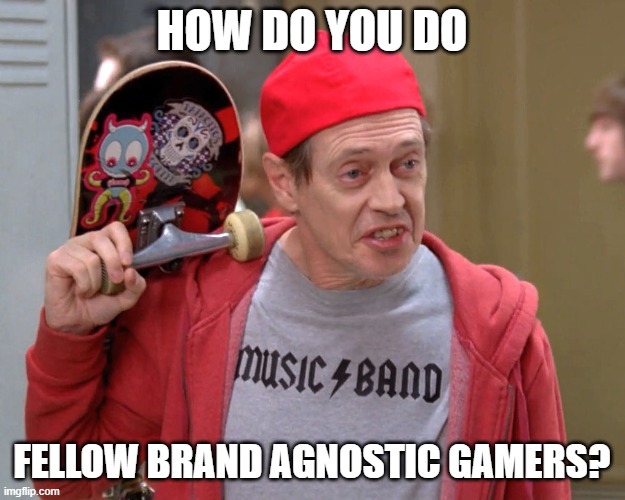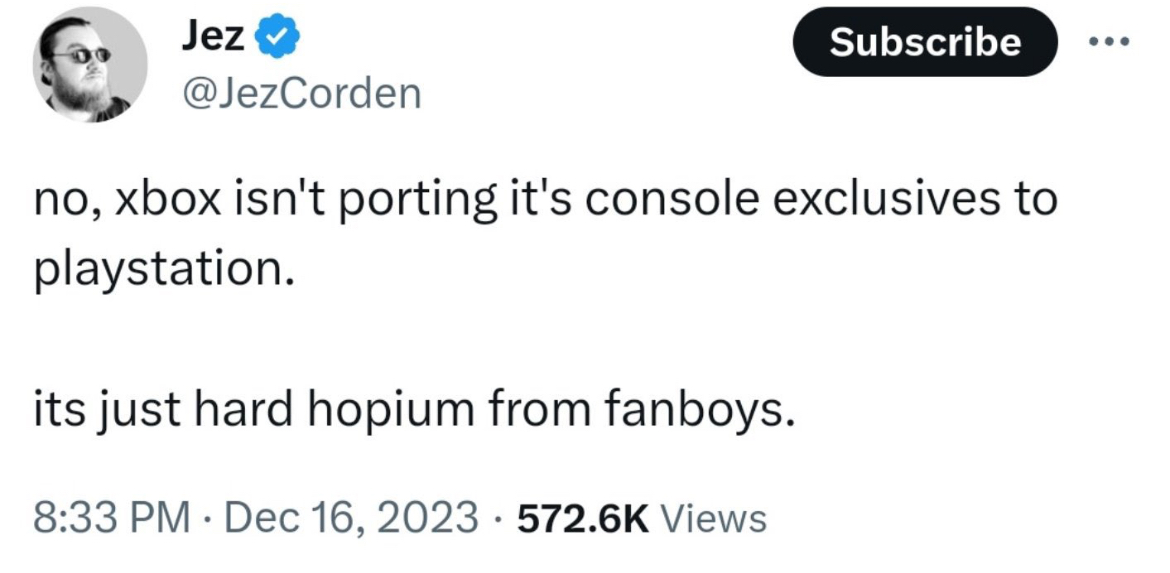thicc_girls_are_teh_best
Member
Tentpole single-player games being platform exclusive at launch was never not going to be the case.
As I've explained before, the *entire* premise of first-party is to serve as brand-identity leaders for the platform. Because if they were looking purely to maximize direct revenue return they'd target the widest audience possible.
If a game is multi-player or service-based then naturally the calculus changes because titles like that live or die based on engagement numbers, so the priority becomes to open wide with MAU as a KPI, because the assumption is within any user cohort there will a hardcore of "whales" who will contribute disproportionately to the overall revenue stream.
In a single player stand-alone offer, essentially every sale made is of equal value. So opening "narrow" then going "wide" in terms of addressable market makes much more sense as its a value driver to the host of the "narrow" distro channel through FOMO and brand identification.
But the thing is, even many GAAS titles don't need multiple platforms to succeed, once the platform itself is established and entrenched in a major way. We saw that even back on PS2 with games like SOCOM, and we see it today on Steam with games like Counterstrike 2 and DOTA 2.
Generally speaking, a GAAS title being on as many platforms as possible sounds like a good thing on paper, and if you can pull it off in practice, brings a lot of benefits. But it can also harm the game if optimization resources are spread too thin among those platforms, because that has to now get balanced alongside having constant or near-constant content updates.
In that way, GAAS titles still face the same problems of resource thinning as non-GAAS title, but it's probably exacerbated in their case because of the nature of GAAS content update cycles.
The first sentence is exactly it and just absolute common sense. Outside of MP titles, the Show and maybe a Lego game, it makes total sense. Putting a 6 to 12 to 18 to 24 month delay on SP titles, on a per title basis also makes sense.
No; even staggered delays introduce problems. Late-comers to the platform throughout the generation who have tastes in a variety of games will, among other things, weigh the offering of exclusive titles on that platform to help determine a purchase.
If I'm in the market for two platforms and know one of them has a platform holder who's been porting earlier titles to the second platform and will port their newest games to the second platform in a short time frame, then assuming I don't have FOMO, chances are I'm going to consider the second platform over the first.
But supposing you want to still do staggered releases, then you need to have a genuine virtuous cycle of showing priority to your main platform. If you port a 1P title to PC, if you even announce such a port, you'd better have a new 1P game ready to reveal or release as exclusive for your own hardware to balance that out. Balance out the messaging, balance out the pipeline, balance out the releases. SIE haven't had a good balance this gen because AAA dev takes longer, most of their studios don't have additional teams for AA, and 3P pubs seem much less inclined to provide exclusives on the platform.
The optimal approach depends on the stage of the console life cycle imo. I would not be surprised if they pull back from PC temporarily when PS6 releases, to encourage as many as possible to buy the console, only to move back towards being PC friendly later.
Tsushima did very well on PC. If they think eg. not releasing Yotei or Astro Bot on PC is going to make a significant number of PC gamers go and buy a PS5 at this stage, they are dreaming.
But it might. The original purpose of the whole strategy was to use ports of old games to draw some of those PC users to pick up a PlayStation for the sequels and other exclusives & whatnot.
However, you screw up that entire strategy if you establish a cadence of porting all of your new releases to PC in increasingly short time frames, because now those PC gamers have less a reason to pick up a PlayStation. Which is the mistake SIE's made this gen.
If there's any time for SIE to start correcting that, this is the time, during a transitional period. FWIW I don't think they need or should scale back on porting everything to PC; many of the GAAS titles would be fine to keep over there, for example. And maybe porting collections of legacy PS1/PS2/PS3 titles would be sufficient too, even to platforms like Switch 2, if it meant getting new entries or similar in those IP for PlayStation.
But if they did (or do) have plans for a PS store on PC, I don't necessarily see a reason to put that on Windows. They could carve out their own space on Linux with that, or try doing it on MacOS. Or just drop that altogether and bring a better suite of productivity & multimedia features to PS consoles while innovating with their designs in terms of some modular upgradability paths, additional SKUs for various price points, improving the services etc. I mean Sony (well, Kutaragi) talked about wanting the PS2 to be like a computer way back in the day, maybe it's time SIE start looking into bringing over more of those types of features & benefits while retaining the highly optimized & established framework they've built for PlayStation consoles the past five generations.






